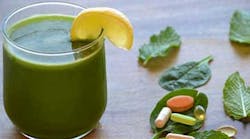Medication-induced bleeding when your patient 'doesn't take any medication'
The negative effects that prescription oral anticoagulant medications—such as Coumadin (warfarin), Lovenox (heparin), Eliquis (apixaban), Pradaxa (dabigatran), and Xarelto (rivaroxaban)—have on hemostasis are well known by clinicians as well as many of the patients who take them. In addition, many antiplatelet agents are associated with an increased tendency toward bleeding, such as Plavix (clopidogrel), Brilinta (ticagrelor), Pletal (cilostazol), Aggrenox (extended release aspirin), and aspirin.
Prior to engaging in patient care, especially when that treatment involves surgical procedures with bleeding, it is the clinician’s responsibility to take an accurate medical history to record any medications being taken. In addition, since patients don’t always give accurate accounts of medications they take, it is good practice to familiarize yourself with medical conditions that require the use of these medications, such as a history of myocardial infarction, atrial fibrillation, peripheral artery disease, prophylaxis/treatment of deep vein thrombosis, stroke, transient ischemic attacks, unstable angina, coronary artery disease, etc. Of course consulting with the patient’s treating physician is always recommended in cases of ambiguous medical history recollection and/or uncertainty on the dentist’s part. Written clearance is advised, especially in cases where the patient is to continue or discontinue medications.
Unfortunately, treating dentists and patients are not always familiar with over-the-counter (OTC) medications, such as herbal medications and supplements and their effects on hemostasis. It is estimated that $28 billion per year is spent on herbal medications and supplements, and more than 29,000 different types of these medications exist. It is, therefore, safe to say that many of the patients you encounter will be taking or will have taken OTC medications. Many patients do not consider this type of vitamin and/or herbal supplementation to count when asked, “Are you currently taking any medication?” Because it can be commonplace to overlook the effects these medications have on dental care—especially when it comes to hemostasis—it may behoove the dentist to include a separate inquiry on the medical history form that pointedly asks patients about their use of any vitamins, nutritional supplements, and/or herbal remedies.
Many OTC medications are associated with increased bleeding, but these are my top five in terms of popularity of use by patients:
- Ginseng—increases resistance to stress and acts as an antioxidant. It is also taken to increase physical and cognitive performance. It acts as an anticoagulant and can interfere with blood pressure medications as well as blood glucose-lowering medications.
- Ginkgo biloba—improves blood circulation by inhibiting platelet aggregation and is used to improve mental awareness and memory retention. It has significant anticoagulation properties.
- Ginger—improves digestion and can be used to relieve motion sickness and nausea. It interferes with coagulation and some forms of cardiac medications.
- Garlic—improves cardiovascular performance and lowers cholesterol. It can increase the potency of anticoagulation medications the patient is taking, such as Coumadin, NSAIDS, and other antiplatelet agents.
- Vitamin E—fat-soluble vitamin with antioxidant properties that is used to enhance cardiovascular performance and decrease free radical destruction and aging. It has anticoagulation properties that increase bleeding.










